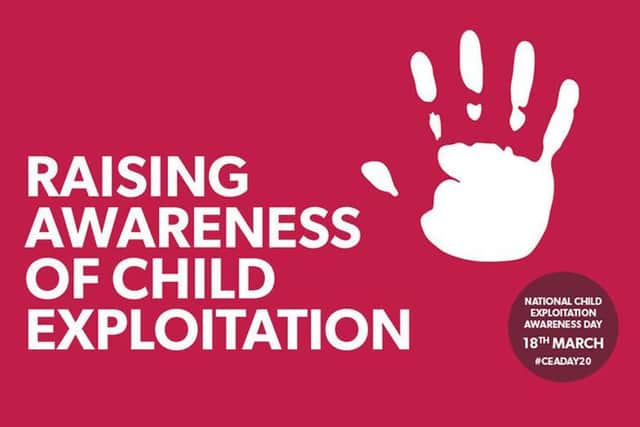National Child Exploitation Awareness Day: Northamptonshire Police urge public to 'think, spot and speak out' against abuse
and live on Freeview channel 276
Detectives in Northamptonshire are urging everyone to 'think, spot, and speak out' against abuse on National Child Exploitation Awareness Day on Friday (18 March).
The campaign aims to highlight the issues surrounding child exploitation and calls on people to adopt a zero tolerance to adults developing inappropriate relationships with children or children exploiting and abusing their peers.
Advertisement
Hide AdAdvertisement
Hide AdDCI Johnny Campbell, head of the Northamptonshire child protection team said: “Children are often too frightened to speak up themselves to either disclose offences or seek support.


"Often that's due to stigma, prejudice or embarrassment or the fear that they will not be believed, so we need to be their voice.
“Abuse is often hidden in plain sight – the signs are there if we look for them.
"We need everyone to be thinking about child exploitation, spotting it, and speaking out so we can protect victims, deter sexual predators, and stop those looking to coerce and lead children into a life of crime.”
Advertisement
Hide AdAdvertisement
Hide AdCampaigners warn that any child can be exploited or abused, no matter their background, culture, ethnicity or religion, whether they are a boy or girl.
There are lots of signs to look for — one sign on its own does not mean someone has been exploited, but several signs together should give you cause for concern. Things to look out for include:
■ Changes in appearance: Clothing, personal hygiene, talking differently, tired.
■ Injuries: Unexplained bruises, cuts, burns, marks. Reluctance to seek medical attention.
Advertisement
Hide AdAdvertisement
Hide Ad■ Spending more time online. Secretive activity, Reluctance to come offline. Have they distanced themselves from family, friends and usual activities? Receiving odd calls and messages.
■ Change in friends: Sudden changes in who they are ‘hanging out’ with, including meeting new people from social media. Associating with older men and/or women.
■ Possessions: Unexplained items, e.g., new clothing, money, phone, jewellery, drugs.
■ Have they become unusually secretive, fearful or withdrawn, aggressive or distanced themselves from family and friends or involved in anti-social behaviour?
Advertisement
Hide AdAdvertisement
Hide Ad■ Discovering they have been going to new places where they have no obvious connections.
■ Coping mechanisms: Alcohol/drug use/self-harm – what they may be doing or using in order to cope.
■ Missing day or night: Missing from home or education. Not knowing where they are or who they are with.
DCI Campbell added: “Our team has the commitment, focus and dogged determination to bring all those who exploit children to justice, and we will go after anyone who sets out to harm children – but we need help from our communities in order to protect those at risk .
Advertisement
Hide AdAdvertisement
Hide Ad“My officers and staff investigate child sexual offences – both historic and present day, allegations of neglect, physical and mental abuse, exploitation and the serious injury or death of a child. We will do everything we can to stop the abuse and criminal exploitation of children.
■ If you suspect a person of carrying out child criminal exploitation, or think someone you know has been a victim, or may be soon, visit the Northamptonshire Police website How to report possible child abuse section or call the non-emergency number, 101. If someone is in immediate danger of harm, please call 999 .